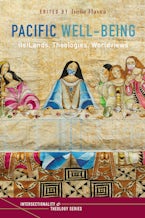In the face of climate change and ecological diminishment, how can we hope that creation itself--good and beautiful, marked by tragedy and chaos--is taken up rather than left behind? Can a Christian vision, which has at times been drunk on eschatological dreams (or nightmares) that consign this world and most of its creatures to destruction, foster an earthly hope?
Jurgen Moltmann and Sallie McFague offer two contemporary possibilities for an ecological eschatology. Floyd critiques both of these theological visions and traces an alternative that is both humble (grounded in the humus, the dirt) and hopeful (grounded in divine creativity), arguing that a "down-to-earth" hope is grounded finally in beauty: the beauty of the other that draws out the self, the beauty of the redeemed self coming out to meet the other, and the beauty of God that lures forth ever-new possibilities and gathers up all the beautiful and broken creatures into the deepest possible harmony.
Richard A. Floyd has taught at Columbia Theological Seminary in Atlanta, Georgia, and published several essays in the Feasting on the Word and Feasting on the Gospels series. He is an ordained minister in the Presbyterian Church (USA) with fourteen years of experience as a parish minister. His PhD in theological studies is from Emory University.
"Richard Floyd offers a robust defense of Christian hope in the face of environmental degradation, a humble hope grounded in creation (humus), a fertile hope founded in faith in God's creativity, and a realistic hope that bears witness to the suffering and beauty of the created order."
--William P. Brown, William Marcellus McPheeters Professor of Old Testament, Columbia Theological Seminary
"Down to Earth is a particularly insightful and original contribution to ecological theology. Floyd closely attends to the devastation with which we are threatened, but more importantly draws our attention to Christian theological sources that offer a counter-vision . . . His is an important and exciting new theological voice weighing in on a most urgent topic."
--Wendy Farley, Professor of Religion and Ethics, Emory University
"Climate change may be the most urgent issue in the twenty-first century. Neither traditional nor contemporary Christian interpretations of creation provide an adequate basis for a response to this impending disaster. Down to Earth does. This insightful, eloquent book reconstructs the doctrine of creation by means of the categories of humility and hope. Every Christian should read this book."
--George W. Stroup, JB Green Emeritus Professor of Theology, Columbia Theological Seminary
"Floyd's powerful book retrieves Christian hope in the face of a deepening sense of global ecological catastrophe . . . [He] skillfully pushes beyond existing ecological eschatological models while articulating an earthly eschatology that is decisively humble, grounded in the dirt, and open to the renewing flow of divine grace."
--Hilda P. Koster, Associate Professor of Religion, Co-Director of Environmental Studies, Concordia College
"Floyd has written a superb study of the vexed interface between Christian hope and the reality of the creation in crisis. He has provided a most helpful critical taxonomy of voices that constitute the current discussion, and framed our thinking about the environment in useful ways. He has a deep sense about the materiality (dirt!) of our faith and invites us to rethink both our reductionism about the environment and our escapist temptations in faith."
--Walter Brueggemann, Columbia Theological Seminary











